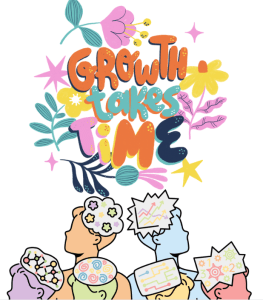
“For thirty years, my research has shown that the view you adopt for yourself profoundly affects the way you lead your life. It can determine whether you become the person you want to be and whether
you accomplish the things you value. How does this happen? How can a simple belief have the power to transform your psychology and, as a result, your life?” (Dweck 2-3).
Psychologist Carol S. Dweck in her book Mindsets explores our fixed and growth mindsets as well as how they impact our attitude toward learning, motivation, and self image and esteem.
Nurturing a Growth Mindset
A “Fixed Mindset” is the belief that our qualities and capacities to learn/grow are carved in stone and unchangeable, causing…
- Difficulties in overcoming adversity and challenges
- Reluctance and fear about taking important risks
- Poor confidence and self-esteem
- A lack of self-awareness
- Overwhelming negativity and doubt
A “Growth Mindset” is the belief that our qualities and capacities to learn and grow are something we cultivate over time through our efforts, strategies, and help from others. With a growth mindset, we
realize we can change and grow over time! It is important to understand that reactions like frustration, confusion, or anxiety in response to learning challenges are normal. A “Fixed Mindset”, the opposite of a “Growth Mindset” is the belief that our qualities and capacities to learn and grow are carved in stone and unchangeable. This can cause difficulty in overcoming adversity and challenges, reluctance and fear about taking important risks, overwhelming negativity and doubt, and poor confidence and self-esteem.
Try to switch off the “struggle switch” when anxiety comes up around writing and learning. When switched on, we decide that we’re going to struggle against the emotional or physical obstacles that come
our way. When switched off, we accept that anxiety and frustration are normal reactions, but we do not have to hold onto them. With the struggle switch turned off, we tend to feel more engaged and and encouraged in learning challenges.
Reflect on what moments, environments, self-care acts, and languages are most helpful for you when engaging in learning and try to show this compassion to yourself when challenges arise. Showing yourself patience and kindness when hitting sticking points in your learning can include taking breaks, seeking support, asking questions, and reminding yourself that you have learned difficult things in the past — you got this!
Steps for Developing a Growth Mindset in Writing
Listen to yourself
Validate frustrations when facing learning and writing challenges; practice self-care; pay attention to what is helpful and nurturing while learning and writing. While there are many emotions and emotional factors related to the learning process, including a lack of motivation, isolation, insecurity, sadness, and worry, there are also positive emotions and emotional factors we experience as well! Positive emotions and emotional factors include happiness, curiosity, community, creativity, and fulfillment!
Recognize that you have a choice.
Once we’re aware of the two mindsets, we have a choice– to continue choosing a fixed mindset about ourselves and our ability to learn how to write OR to embrace and work towards a growth mindset that recognizes our abilities to overcome our discomforts with writing and eventually feel more confident.
Challenge your fixed mindset.
The fixed mindset is made up of narrative scripts (e.g. “I’ve always been bad at writing” or “I’m never going to learn this”)– these scripts are not fact or truth, though. It’s just our fixed mindset and inner critic! Acknowledge the inner critic (“I’m noticing the ‘I’m bad at writing’ narrative because I’m stressed about this assignment”) and accept that frustration and struggling are normal, but the narrative in our head is not reality– we can choose to take actions that align with our values and goals instead.
Take action.
Create small, feasible goals; seek support when needed; take breaks (rest is very important for effective learning!); validate and recognize your progress– both in learning and in nurturing growth mindset; utilize tools and strategies that are helpful, especially for developing more efficient and confidence-boosting processes with writing.
Ask for help.
Facing emotional and social barriers during the writing process is all too common. Remember, you’re not alone. Here is a list of resources on campus that are here to help you if you feel overwhelmed by this process or would like someone to talk to. Never be afraid to ask for help when you need it.
UCI Basic Needs Center | 949-824-0607
The Basic Needs Center is committed to making UCI a basic needs-secure campus by fulfilling the basic needs of all students – which include food and housing security – a guaranteed right for every person.
UCI Counseling Center | (949) 824-6457
The UCI Counseling Center is committed to delivering quality services that help students achieve optimal mental health for academic success, personal growth, and increased capacity to cope with the stresses of being a university student. The Counseling Center also provides training and learning opportunities to prepare future leaders in mental health and other service-oriented positions.
UCI CARE | 949‑824‑7273 (They also accept walk-ins)
UCI CARE provides free and confidential support services to members of the UCI community who have been impacted by sexual assault, relationship abuse, family violence and/or stalking.
